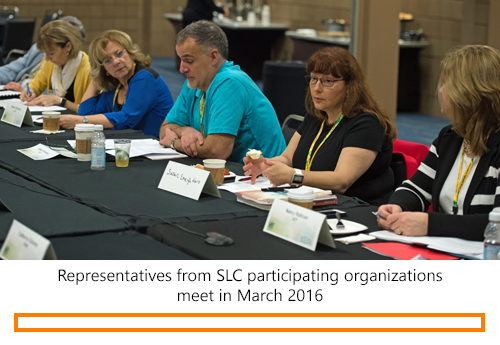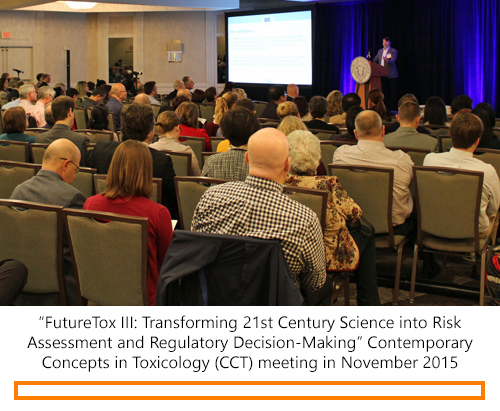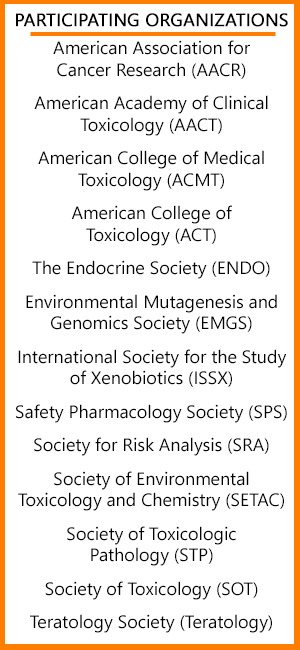
By Mary Jeanne Kallman, Past SLC Chair, and Donna L. Mendrick, 2016–2017 SLC Chair
 The Scientific Liaison Coalition (SLC) grew out of the Human Health and Disease Prevention Summit held in July 2010 that was attended by several SLC founding societies, including the Society of Toxicology (SOT). The mission for this ad hoc coalition is to form a partnership of scientific societies with a common goal of improving public health through a collaborative interdisciplinary approach. In 2014, the SLC became a self-sustaining organization and currently includes 13 scientific, biomedical, and health-based societies working together to develop forums to explore cutting-edge topics via webinar series, conferences, and sessions/courses at the annual meetings and other scientific conferences of the participating societies.
The Scientific Liaison Coalition (SLC) grew out of the Human Health and Disease Prevention Summit held in July 2010 that was attended by several SLC founding societies, including the Society of Toxicology (SOT). The mission for this ad hoc coalition is to form a partnership of scientific societies with a common goal of improving public health through a collaborative interdisciplinary approach. In 2014, the SLC became a self-sustaining organization and currently includes 13 scientific, biomedical, and health-based societies working together to develop forums to explore cutting-edge topics via webinar series, conferences, and sessions/courses at the annual meetings and other scientific conferences of the participating societies.
The coalition’s first successes on this front occurred in 2013 when the SLC developed and presented two sessions at the 2013 SOT Annual Meeting and ToxExpo: a Symposium Session titled “Biomarkers of Disease and Toxicity: Exploiting the Interconnections” and a Continuing Education (CE) course titled “Understanding Toxic Neuropathy Related to Oncology Drugs: Both Clinical and Non-Clinical Perspectives.” This CE course also was presented at a Safety Pharmacology Society Annual Meeting, as the submission was developed to integrate both preclinical and clinical expertise to provide an integrated discussion of the safety topic of peripheral neuropathy. Also in 2013, the SLC-sponsored session “Adverse Outcome Pathways (AOPs) for Developmental Toxicology” was presented at the Teratology Society Annual Meeting. Since then, the SLC has sponsored or endorsed many sessions at meetings of its participating societies, including sessions for the Society for Toxicologic Pathology, but also has expanded its efforts to use an integrated approach to impact the scientific arena beyond sessions at existing meetings.
 The SLC actively collaborates with its participating societies to plan meetings on topics of importance to public health. For instance, the SLC has worked with SOT on meetings related to new technologies and advancements that will impact the future landscape of toxicology. The SLC planned and hosted the “FutureTox II” and “FutureTox III” Contemporary Concepts in Toxicology (CCT) meetings to continue discussions around these topics and to update global attendees and scientists of developments in the area. These meetings were well-attended, and the SLC is currently planning a “FutureTox IV” meeting for 2018.
The SLC actively collaborates with its participating societies to plan meetings on topics of importance to public health. For instance, the SLC has worked with SOT on meetings related to new technologies and advancements that will impact the future landscape of toxicology. The SLC planned and hosted the “FutureTox II” and “FutureTox III” Contemporary Concepts in Toxicology (CCT) meetings to continue discussions around these topics and to update global attendees and scientists of developments in the area. These meetings were well-attended, and the SLC is currently planning a “FutureTox IV” meeting for 2018.
More immediately, the SLC is sponsoring the “Metabolic Syndrome and Associated Diseases: From the Bench to the Clinic” CCT meeting on Saturday, March 11, 2017, in Baltimore, Maryland. A satellite meeting of the SOT Annual Meeting, this event will address the major public health concern of metabolic syndrome. Individuals with metabolic syndrome have signs similar to that of toxic responses (e.g., oxidative stress and inflammation) and organ dysfunction. Metabolic syndrome is a combination of risk factors that can lead to greater potential of type 2 diabetes, obesity, lipid disorders, cardiovascular disease, and other circulatory disorders. It is estimated that metabolic syndrome affects more than 20% of adults in the United States and European Union. Given the rapidly growing incidence of this syndrome, it is critical to understand these widespread abnormalities as it changes the definition of “normal.” The overarching objectives of this conference include defining knowledge gaps, identifying research needs, protecting public health, and empowering product development. [For more information on metabolic syndrome, see “Metabolic Syndrome: Toxicology’s Next Patient,” Communiqué Winter 2017.]
 Beyond in-person meetings, another scientific contribution of the SLC is the development of diverse overarching webinars. Since 2014, the SLC has sponsored and recorded 10 interactive webinars on diverse topics from “Regulatory Perspective on the Use of Animal Models Disease in Drug Development,” presented by Sruthi King, PhD, US Food and Drug Administration (US FDA), to “Precision Medicine—Getting Personal on Safety,” presented by Sian Ratcliffe, PhD, Pfizer. Theses webinars have attracted as many as 500 participants, facilitating the sharing of new and novel scientific information to the members of SLC participating societies. The SLC is continuing its webinar series with an upcoming session titled “The Prescribing Cascade and Toxic Drug Events” on February 28, 2017.
Beyond in-person meetings, another scientific contribution of the SLC is the development of diverse overarching webinars. Since 2014, the SLC has sponsored and recorded 10 interactive webinars on diverse topics from “Regulatory Perspective on the Use of Animal Models Disease in Drug Development,” presented by Sruthi King, PhD, US Food and Drug Administration (US FDA), to “Precision Medicine—Getting Personal on Safety,” presented by Sian Ratcliffe, PhD, Pfizer. Theses webinars have attracted as many as 500 participants, facilitating the sharing of new and novel scientific information to the members of SLC participating societies. The SLC is continuing its webinar series with an upcoming session titled “The Prescribing Cascade and Toxic Drug Events” on February 28, 2017.
The SLC is an active group looking to expand its interdisciplinary partnerships with new society memberships. The 13 currently participating societies are the American Association for Cancer Research, American Academy of Clinical Toxicology, American College of Medical Toxicology, American College of Toxicology, The Endocrine Society, Environmental Mutagenesis and Genomics Society, International Society for the Study of Xenobiotics, Safety Pharmacology Society, Society for Risk Analysis, Society of Environmental Toxicology and Chemistry, Society of Toxicologic Pathology, SOT, and the Teratology Society. Benefits to the SLC member societies include identification of up to three representatives to the SLC who will contribute to monthly conference calls and participation in two face-to-face meetings, conducted in conjunction with the SOT Annual Meeting in the spring and with another SLC member society meeting in the fall. The SLC is a small group; thus, representatives participate directly in decision-making and networking with scientists from other societies to broaden their scientific circle of contacts. There are minimal yearly dues that are based on a sliding fee scale of $1,000 to $3,000 based on the size of the society. To learn more about the SLC, please visit the SLC website.